- Home
- William Ritter
The Dire King Page 17
The Dire King Read online
Page 17
Chapter Twenty-One
Had I been less secure in my own talents, I might have found it somewhat embarrassing to be the least graceful person in a group that also consisted of a madman wearing a lumpy tea cozy on his head and a grievously injured woman with only one functional arm. Jackaby and Serif moved through the stronghold like shadows, however, and I kept up with them as stealthily as I could.
Within the tall curtain walls of the hold stood half a dozen stout stone buildings with thatched roofs, all circling a fortified tower: the keep, the top of which had been replaced with a broad dome, like the roof of an observatory. Wooden scaffolding circled the outside of the structure, climbing halfway up the walls. Behind this, I could see thick metal tubes and snaking pipes that had punched their way out of the stonework and clung all over the tower like ivy. Here and there in the larger gaps between the metal and the bricks, I made out glimpses of what lay beyond.
It was like peeking into the inner workings of an enormous clock. If the Palace of Westminster were reduced to ruins and its great Clock Tower riddled with cracks, the effect might be similar. I could see bits and pieces of truly massive cogs revolving within the masonwork.
We made our way down from the wall along a very narrow, excruciatingly exposed staircase. With every step I was waiting for an alarm to sound and the entire compound to descend upon us. Miraculously, we reached the ground without incident. No sooner had we done so, however, than we heard the pounding of feet and the clatter of steel. Without a word, all three of us pressed into the shadows of the nearest structure, a rectangular building that smelled of hay and manure.
I held my breath as five, ten, twenty soldiers hurried up the narrow stairs we had just dismounted. Their ears stuck out like goblins’, but unlike goblins, these troops were seven feet tall at the shortest. They were broad shouldered, with forearms as thick as a grown man’s waist. Although leaner and faster than the mountainous ogres, they still looked as though they were bred for battle.
“Trolls,” whispered Jackaby.
The troll in front stood at the top of the stairs and yelled something in a voice that sounded like a mixture of human vocal cords and untuned cello strings. I did not recognize the language. The rest of them split off evenly, half moving along the top of the wall to the left, the other half to the right.
“They’re looking for us, in case there was any question,” Serif hissed from her quiet patch of darkness. “They have noticed that someone in this castle is dropping ogres and pitching vampire heads off the walls. The commander just reminded his troops that they are under orders not to let the intruders get out of here alive.”
“Well, that’s good news, at least,” Jackaby whispered. “They’re worried about us getting out of here. They don’t know we’re still working on getting in.”
“That is a great comfort, sir,” I answered.
We kept to the shadows whenever possible, moving ever inward toward the domed keep in the center. For the last stretch, Jackaby found us cover by climbing up within the rafters of a long, thatched building. The crawl space was narrow and cramped, but better a claustrophobic attic than a claustrophobic coffin. From the chamber beneath us I could smell steam and blood and raw meat, and I found myself hoping very much that we were above a kitchen. We reached the end and peeked through the thatch. A courtyard lay directly between us and the tower, and in this space stood milling at least a hundred monstrous creatures. I recognized more trolls, imps, and ogres, but there were also swarms of fairies no bigger than locusts, great mangy wolves the size of bears, and wraithlike figures in tattered black robes who seemed to swim through the air, their rags trailing behind them like seaweed behind a trawler.
“Wights,” Jackaby breathed. “Brownies, manticores, kaiju, jumbies, lobs, hobs—just about every Unseelie creature ever mentioned in Mendel’s Magical Menagerie—and a few even I don’t recognize.”
“We’ll go around to the back of the keep,” said Serif.
“We’ll need a distraction if we hope to get to the far side of the tower without being seen by that crowd,” I said.
“Leave that to me.” Serif reached into her robes with her good hand and pulled out a slim metal tube. She selected a dart from a little wooden box and slid it into the tube.
“Poison?” Jackaby inquired as Serif maneuvered herself painfully into a position from which she could see the throng through the thatch.
“Boxwood ash and mandrake root,” she answered.
“That’s a somnifacient, isn’t it?” said Jackaby.
“We use it as a kobold sedative.”
“Might be effective against the hobs, then, but even if it is, putting a single hob to sleep won’t do much to improve our situation.”
“This is not my first mission, Seer. It would drop a kobold, hob, or any lesser oddling. Against trollkin, however, it has the opposite effect,” she grunted. “Increases violent tendencies.”
“Best not to do that, then,” Jackaby said.
Serif’s cheeks puffed out and the pipe made a soft thoom. I pushed my head up to peer through the scratchy thatch. A muscular troll carrying a cudgel the size of a small child slapped at his neck as though bitten by a mosquito. He spun angrily, his lips curled back in a snarl.
“You missed,” said Jackaby.
“I really didn’t.”
The big troll glared at the swarm of brownies fluttering in the air behind him and swung the cudgel through the cloud, which scattered and chittered angrily. The cudgel, finding very little resistance from the brownies, slammed instead into the back of a pale giant who sat hunched over in the dirt. The giant unfolded. He was so massive, he could have leaned casually with his elbow on the head of one of the ogres we had fought earlier. Beneath ice-white hair and pallid skin, he wore a simple tunic that might have doubled as the sail of a Spanish galleon.
“Oh. Oh my. That’s got the jötun’s attention now,” Jackaby said. “This is the plan?”
“Wait for it.”
The jötun rose to his feet. The troll clutched his cudgel and looked up. And then he looked farther up. The ground beneath the jötun began to glitter with spreading crystals of ice. The jötun raised one enormous foot and stomped. The building beneath us shook. In a circle all around the jötun, creatures were thrown to their backs and dusted by a glittering flurry of ice. Even from our hiding spot, I felt the wave of cold wash over us. There was now a cloud of sparkling mist surrounding the troll and everyone next to him. The monsters at the far end of the assembly were craning their necks to see the frost giant, who was only visible from the waist up. The sounds of scuffling and snarling were coming from within the icy mist at his feet. It was pandemonium.
“Now,” said Serif.
Chapter Twenty-Two
As the sounds of the furious brawl came muffled through the thatch, Serif carved a hole at the back side of the roof and slipped out. We followed, padding as quietly as we could after her across the grass. By now the sun was high in the sky, and shadows were getting scarce. Part of me would have liked to tuck myself into a ball up in that attic and stay there until everything was over, but I gritted my teeth and forced my legs to pump, and we sprinted the last stretch. We were in plain view of the courtyard for only a few seconds, and even though the attention of the crowd remained fixed on the scuffle in the back, my heart was still pounding in my chest by the time we reached the far side of the hold, tucking ourselves under the cover of the creaky scaffolding.
“There’s a charm on the whole building,” Jackaby observed. He blinked at the stone. “It’s strong.”
“Defensive?” Serif asked.
“Protective. Hold on—” He pulled a series of little glass lenses from his pocket and peered at the stone through them. Serif glanced around impatiently. “The whole tower is held together by a net of magic. Probably necessary, by the looks of it. They’ve torn right through the support walls.”
“Just a coherence charm, then?” said Serif. “No defensive hexing or barrier spells?”
“None that I can see,” said Jackaby. “But there’s all sorts of energy on the inside that I can’t understand. Best proceed with caution.”
“Hm. You’re a bit useful after all, Seer,” Serif grunted. She scrabbled up the scaffolding, holding her injured arm against her side as she pulled herself up one-handed. Jackaby and I followed. Halfway up the wall, we reached a cleft in the stones large enough to peer through. Jackaby pressed his face up against the gap, and when he pulled away he did not look happy. I slid up to have a look for myself.
The hold was a mess of copper and bronze. Somewhere down below, massive turbines were humming; I could feel the vibration of them through the stone. Clockwork ranging in size from carriage wheels to cogs took up an entire story of the tower. Somewhere above us, light crackled and popped, a golden-yellow glow with flashes of electric blue illuminating the bricks and metalwork. Heavy girders were bolted to the stone, and a staircase snaked up around the tower, following the curve of the wall. The remnants of a demolished landing were visible a few feet above us.
“I can’t tell if the machine is at the top of the tower or the bottom,” I said.
“I believe the machine is the tower,” said Jackaby behind me. “There are unnatural energies running in and out of every inch of the building. The power it’s generating is incomprehensible. Well, not generating, per se. Channeling. Directing. I think we’ve found our spear.”
“Our spear?” I said, pulling my eyes away from the sight.
“Hafgan’s spear was never a real spear. It was a metaphor. The spear grips the hand that grips the spear. Power takes hold of those who take hold of power.”
“Do you suppose that’s why Hafgan went bad?” I said. “Maybe he really did start out with the best intentions, but then power changed him? That would explain why Arawn had to kill him—why Arawn was able to kill him at all, even with the twain’s shield protecting him.”
“It fits. All this time we’ve been thinking of Morwen’s sword as the new spear, but it’s not at all, is it? The blade was just a tool. The Dire Council created a machine to do the same thing, to channel the sort of power no single soul was ever meant to control. The first attempt was destroyed a decade ago—Jenny’s fiancé saw to that when he gave up his life to sabotage its construction—but it has been remade. And by the look of it, they’ve gotten it right this time.”
“Up here,” Serif whispered from above us. Jackaby and I clambered up on the swaying scaffolding to reach her. A thick pipe emerged from the brickwork where she stood. It ran up the wall several meters and reentered the building near the domed roof. The stones had clearly been knocked out to make room for the addition, and several of them were cracked and falling apart. There was space enough for someone very thin to squeeze through between the metal and the wall.
Serif plunged through the gap sword-first. Her lithe frame caught at the hips, though, and a cracked brick the size of my head began to slip loose. I grabbed for it before it could fall and crash down the scaffolding. It was lighter than I expected.
“What sort of stone is this?” I asked Jackaby. “It’s like lifting a stale loaf of bread! Here, we can make the hole a little larger if we—” But the moment I pulled the brick away from the wall it wrenched my arms downward and smashed into the rickety platform. The scaffolding rocked perilously for several seconds.
“That would be the coherence charm,” said Jackaby. “It’s designed to prevent the building from collapsing by nullifying the material’s gravitational burdens. Outside of the charm’s range, gravity still exists.”
We widened the gap, taking care to set the rest of the stones down as gently as we could on the scaffolding, and then pressed our way into the building.
The keep was four stories tall. The floorboards on each level had been almost entirely knocked out to make room for the metal girders and myriad pipes and cables winding through the building. We found ourselves on what was left of the second-story landing.
On the ground level, just below us, a pair of rumbling generators sat against the wall. In the center of the floor, away from the cascade of coiling cables, stood three identical metal frames. Each was about eight feet tall, but they looked distinctly like empty coffins stood on end—albeit coffins constructed by an emotionally troubled metalsmith.
I looked up. Right ahead of us was suspended a curious contraption, hanging from a huge articulated metal arm. Its design was not unlike that of an enormous microscope: a brass canister as big as a bathtub with three smaller cylinders affixed to the bottom. Instead of lenses, each of these was capped with something halfway between a lightning rod and the nozzle of a fireman’s hose. All three were attached to the larger canister by a series of interlocking cogs and joints, as though each could be finely adjusted. At present, they were aimed directly at the metal coffin-like frames below.
“My word,” Jackaby breathed.
“What do you suppose it does?” I asked, but then I realized Jackaby was not looking at the brass device. I followed his eyes up. The landing above housed some sort of platform, although I could not make out what was on it from where we stood. Higher still, fabricated out of gleaming copper and burnished bronze, unfurled a mechanical marvel unlike anything I had ever seen.
It was twenty feet across, its framework butting against the walls around it on every side. It looked like a glorious rose made of living metal, every petal a polished disc, constantly circling in a pattern of inscrutable complexity. The discs on the rim glowed faintly, like an iron just pulled from the fire, and those in the very center were almost too bright to look at directly. It was beautiful, it was brilliant, and it was trying very hard to destroy the world.
Shadows danced in the dark tower as a pulsing beam of warm, golden light issued from the whirring discs. Sparkles of white light twinkled in the golden rays, moving upward, drawn in toward the center of the mechanical rose by the inscrutable forces of the machine.
Where the rippling light illuminated the wall, the tower shredded, stones ripping apart like weathered linen. Emerald light burst through the gaps, and through these I could see not the forests of the Annwyn, but a surprisingly pale sky and a simple country church. It made my insides feel strange—not only because it did not belong in this alien countryside, but because it belonged to a different horizon altogether. The spires of the church stood at a crooked angle, jutting off to the left, the trees beyond it doing the same.
Gears clicked and cogs spun, and the beautiful machine swiveled, its glowing light sliding down along the wall. As soon as the rippling golden beam passed, the rends between the two dimensions began to seal again. The stones knit together, leaving a few chips and spiderweb cracks as the only trace that they had been ruptured moments before. In the light of the pivoting machine, new rips began to form farther down.
“It’s healing itself,” said Jackaby. “The veil is healing itself faster than they can tear it apart. The machine still isn’t powerful enough!”
“No machine is powerful enough to breach the veil.” Serif scowled. She crept along the creaking floorboards until she had reached the edge of our broken landing. The newest split in the veil was only a few feet up from where she stood. Through it, I could see a stained glass window. The glass depicted the Blessed Virgin Mary, upside down, in a mosaic of cheery blues. It felt very out of place inside the grim tower. “This cannot be. The veil is the most powerful force on either of our worlds. This . . . this cannot be real.” She stood on her toes and reached up toward the stained glass window with the tips of her fingers.
That’s when everything went wrong.
The moment the wavering light touched Serif’s hand, she shuddered. Jackaby leapt forward before I could see what was happening. Serif turned her head limply toward us just as her eyes rolled back in her head and her legs went lim
p. If Jackaby had been a moment slower, she would have tumbled over the edge and to the floor below us. He caught her with both hands and pulled her away from the ledge.
“Is she all right?” I cried.
“It’s drained her,” he answered, pulling Serif farther from the strange light. I helped him prop her against the wall. She was barely breathing. “She was in poor shape to begin with, but that thing sapped her in an instant.”
“Will she live?” I whispered.
With a series of mechanical clacks and clicks above us, the machine stopped swiveling. Cogs whirred to a stop.
“She really won’t,” came a familiar voice from above us. Morwen Finstern stood at the crumbling edge of the landing above ours, black blade at her hip and a smirk on her lips. “And neither will you, in case you were wondering.”
Chapter Twenty-Three
Miss Finstern,” said Jackaby. “You’re looking rather . . . villainous. Have you considered not destroying the world, though?”
Morwen sneered. “We aren’t going to destroy the world, you stupid man. We’re going to bring it back. We’re going to make things the way they’re supposed to be again. Your kind have spent far too long alone in an empty arena that was meant for blood. You’ve forgotten what it means to fight for your lives. You’ve grown fat and weak.”
“So kind of you to look out for our best interests. Disseminating some nice pamphlets with advice on diet and exercise might be less trouble for everyone, though. I’d be happy to help you print them up. I know a fellow with his own press. He does marvelous woodcuts.”
“Our kind have grown weak as well,” Morwen continued, ignoring Jackaby. “They have dulled their blades with bureaucracy and diplomacy. They don’t remember what it means to be wild any longer. They live their lives in chains and call it freedom. My father is going to return the worlds to a glorious new age of chaos.”

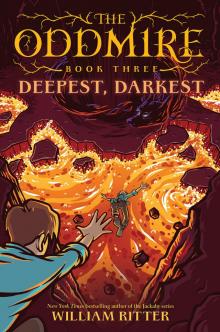 Deepest, Darkest
Deepest, Darkest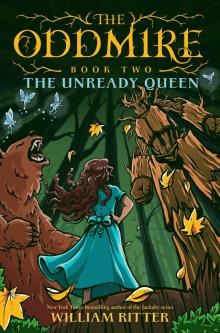 The Unready Queen
The Unready Queen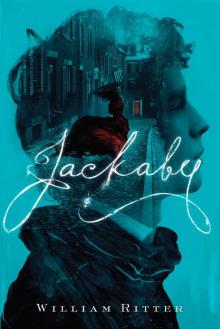 Jackaby
Jackaby Changeling
Changeling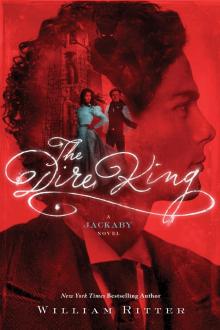 The Dire King
The Dire King Ghostly Echoes
Ghostly Echoes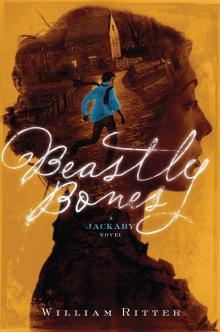 Beastly Bones
Beastly Bones